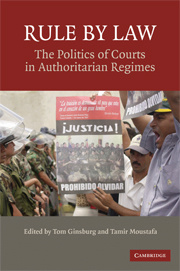Description
Rule by Law
The Politics of Courts in Authoritarian Regimes
Coordinators: Ginsburg Tom, Moustafa Tamir
This volume examines the dynamics of judicial politics in authoritarian states.
Language: English
Subject for Rule by Law:
The politics of courts in authoritarian regimes
Publication date: 05-2008
390 p. · 15.2x22.9 cm
Publication date: 05-2008
390 p. · 15.2x22.9 cm
The politics of courts in authoritarian regimes
Publication date: 05-2008
392 p. · 15.2x22.6 cm
Publication date: 05-2008
392 p. · 15.2x22.6 cm
Description
/li>Contents
/li>Biography
/li>
Scholars have generally assumed that courts in authoritarian states are pawns of their regimes, upholding the interests of governing elites and frustrating the efforts of their opponents. As a result, nearly all studies in comparative judicial politics have focused on democratic and democratizing countries. This volume brings together leading scholars in comparative judicial politics to consider the causes and consequences of judicial empowerment in authoritarian states. It demonstrates the wide range of governance tasks that courts perform, as well as the way in which courts can serve as critical sites of contention both among the ruling elite and between regimes and their citizens. Drawing on empirical and theoretical insights from every major region of the world, this volume advances our understanding of judicial politics in authoritarian regimes.
1. Introduction Tom Ginsburg and Tamir Moustafa; 2. Of judges and generals: security courts under authoritarian regimes in Argentina, Brazil, and Chile Anthony Pereira; 3. Administrative law and judicial control of agents in authoritarian regimes Tom Ginsburg; 4. Singapore: the exception that proves rules matter Gordon Silverstein; 5. Judicial independence in authoritarian regimes: insights from Chile Lisa Hilbink; 6. Law and resistance in authoritarian states: the Egyptian case Tamir Moustafa and Simon Fraser; 7. Courts out of context: the authoritarian sources of judicial failure in Chile (1973–90) and Argentina (1976–83) Robert Barros; 8. An authoritarian enclave? The supreme court in Mexico's emerging democracy Beatriz Magaloni; 9. The institutional diffusion of courts in China: evidence from survey data Pierre Landry; 10. Building judicial independence in semi-democracies: Uganda and Tanzania Jennifer Widner; 11. Judicial power in authoritarian states: the Russian experience Peter Solomon; 12. Courts in a semi-democratic/authoritarian regime: the judicialization of Turkish and Iranian politics Hootan Shambayati; 13. Judicial systems and economic development Hilton Root and Karen May; 14. Courts in authoritarian regimes Martin Shapiro.
Tom Ginsburg is Professor of Law and Political Science at the University of Illinois. He is the author of Judicial Review in New Democracies (Cambridge, 2003), which won the C. Herman Pritchett Award from the American Political Science Association for best book on law and courts in 2004. Ginsburg serves as co-director of the Comparative Constitutions Project at the University of Illinois and runs the Program in Asian Law, Politics and Society.
Tamir Moustafa is Associate Professor of International Studies and the Jarislowsky Chair in Religion and Cultural Change at Simon Fraser University in Vancouver, Canada. He is the author of The Struggle for Constitutional Power: Law, Politics and Economic Development in Egypt (Cambridge, 2007) and a number of articles on comparative law and society, religion and politics, and state-society relations in the Middle East.
Tamir Moustafa is Associate Professor of International Studies and the Jarislowsky Chair in Religion and Cultural Change at Simon Fraser University in Vancouver, Canada. He is the author of The Struggle for Constitutional Power: Law, Politics and Economic Development in Egypt (Cambridge, 2007) and a number of articles on comparative law and society, religion and politics, and state-society relations in the Middle East.
© 2024 LAVOISIER S.A.S.
These books may interest you

Judicial Review of Elections in Asia 172.36 €



